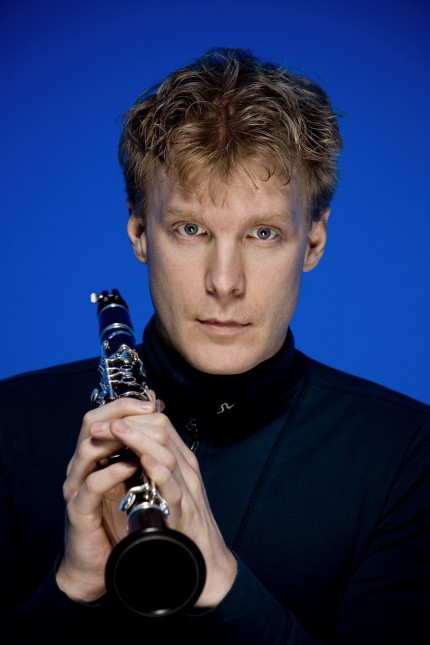Swedish clarinetist sparks a night of rarities at Grant Park Music Festival

So impressed was Carl Nielsen with the performance of his Wind Quintet by the musicians of the Copenhagen Wind Quintet, that the Danish composer resolved to write a concerto for each of its members. Unfortunately, Nielsen didn’t live to fulfill his promise, only completing two concertos, for flute and clarinet.
Nielsen’s Clarinet Concerto formed the centerpiece of the Grant Park Music Festival’s concert Wednesday night at the Pritzker Pavilion, a successful evening that demonstrated Carlos Kalmar’s gift for offbeat programming.
Written in 1928, the work is cast in a single 26-minute movement with four interlinked sections. The Clarinet Concerto inhabits some of the same terrain as Nielsen’s Fifth Symphony, composed a few years earlier, with a similar contour to its themes and a snare drum again attempting to break up the progress of the music.
Nielsen’s Clarinet Concerto is arguably the most difficult concertante work written for the instrument, with technical land mines and some dizzying bursts of bravura that have prevented even some celebrated artists from attempting it.
Clearly, no such dangers exist for the evening’s soloist, Martin Fröst. Standing with feet planted wide apart, the Swedish clarinetist brought astounding technical assurance and a rock-star-like swagger to this demanding music. Fröst blazed through the difficulties, with a robust tone and personality-plus character in the cadenzas, throwing off the virtuosic passages, rapid trilling, and myriad challenges with liquid agility and seemingly effortless ease.
If Nielsen’s concerto didn’t end with an enigmatic quiet coda, the work would likely be better known, but in Fröst’s idiomatic performance, it didn’t seem anticlimactic at all. Kalmar’s vital direction and the playing of the Grant Park Orchestra was as brilliant and committed as that of their soloist. After a resounding ovation, Fröst returned for an extempore encore, riffing on a theme by Malcolm Arnold with a jazz-like freedom and audacity.
The concerto was flanked with two wartime works that could hardly provide greater contrast.
Ralph Vaughan Williams’ Symphony No. 5 was written at the peak of World War II, yet, unlike the English composer’s agitated Fourth, the Fifth Symphony seems to look ahead to a more peaceful time. The most popular of his nine symphonies, the Fifth is also the most representative of Vaughan Williams’ style, a work that virtually defines the English pastoral school. It’s also prime music for al fresco concerts, though rarely heard at summer festivals, this side of the pond, at least.
It’s pretty remarkable how Carlos Kalmar manages to bring off completely convincing performances of such a wide range of repertory. Grant Park’s artistic director clearly is in synch with the reflective nostalgia and strain of melancholy in Vaughan Williams’ music, as shown Wednesday night.
An indoor performance could likely have achieved even more hushed pianissimos, but Kalmar drew daringly quiet playing that hovered on the edge of audibility. The conductor conveyed the serenity of the opening Preludio and brought an organic flow to VW’s long lines and a cumulative strength to the movement’s climax. The bumptious scherzo provided the requisite contrast and the rising, overlapping lines of the closing Passacaglia had just the right benedictory glow (the sun coming out from behind the clouds right on cue).
The Romanza was particularly fine, with Kalmar drawing out the hymn-like spiritual expression—echoes of VW’s Fantasia on a Theme by Thomas Tallis-–while underlining the sinew beneath the surface of this music. Apart from a shaky trumpet in the first movement, the Grant Park Orchestra’s playing was first class with characterful woodwinds and glowing, quite beautiful string playing.
Wednesday’s unusual lineup put the Vaughan Williams symphony first on the program and closed with Bohuslav Martinů’s Thunderbolt P-47.
Samuel Barber said that no composer should write in wartime and, though there’s no overt jingoism in Martinů’s 1945 paean to the title American fighter-bomber, neither is it one of the more timeless works by the Czech composer (not “Polish,” as stated in the notes). Kalmar and the Grant Park Orchestra brought unapologetic advocacy to the driving rhythms and wry bombast of this curio while finding an echo of Vivaldi in the more restrained middle section.
The Grant Park Music Festival continues with Benjamin Britten’s War Requiem 6:30 p.m. Friday and 7:30 p.m. Saturday. grantparkmusicfestival.com
Posted in Uncategorized


Posted Jun 27, 2013 at 1:38 pm by Sam
What was the first encore that he started playing before he “changed his mind”? Also, the source of the Malcolm Arnold theme? Thanks!
Posted Jun 27, 2013 at 1:54 pm by Odradek
I was there and I agree, an excellent concert. All three of these composers should be programmed more often; kudos to Kalmar for putting them on, as well as for conducting so well. And it was nice to see such a big audience come out for this mostly unfamiliar music.